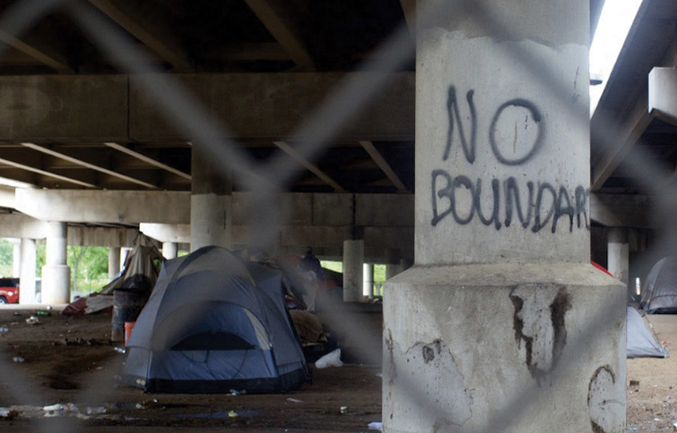Few Dallas issues have skirted the spotlight at City Hall like homelessness, but last year the city came face-to-face with its growing problem.
Last March, the annual point-in-time count, which identifies the total number of homeless people in Dallas, showed that North Texas was surpassing Houston as the homeless capital of Texas. The homeless population had risen 9 percent in Dallas and Collin counties, according to point-in-time. North Texas’ homeless population was now more than 4,500 people.
In two weeks, we’ll learn what happened to that number over the last year. No one could predict what the new figures will show. But Dallas has failed to make progress in the ways it has set out to—namely, by creating permanent transitional housing to get people who are homeless off the streets. It has $20 million in bond funding sitting aside for just that. The city wants to put those units in areas where residents will have easy access to jobs and services, and, in an absolutely ideal world, to fit them within mixed-income developments. That is no different from Dallas’ larger affordable housing goals. But building affordable housing in good neighborhoods is politically tricky enough. Putting in units for the formerly homeless has been so far undoable. That $20 million is just sitting there.
Now, the city will face the issue with new leadership at City Hall. Three weeks ago, the Dallas Morning News learned that Monica Hardman would be leaving. Hired in 2018, Hardman was Dallas’ first director of the Office of Homeless Solutions, an office created in late 2017 by City Manager T.C. Broadnax. She created the city’s first ever homeless solutions strategy. She’s had other successes: this year, Dallas operated its first-ever inclement weather shelter, first during a cold spell in November, and again in December and February. In May, the City Council will vote on a zoning proposal to allow nonprofits and faith-based organizations to create temporary shelters during bad weather. “I’m extremely proud of that, as well,” she says.
But there have also been tribulations, none more public than last August, when Council member Adam McGough reamed out Hardman’s staff for, as he called it, the “incompetent or intentional” mishandling of a property staff was eyeing in his Lake Highlands-area district. He took issue with a lack of transparency. McGough had previously opposed the site during a committee meeting. Such is the difficult and politically charged position in which Hardman operated.
Hardman answered my call after days of driving and unpacking, as she was finally getting settled into her new home in California. Our conversation touched on her decision to leave, the difficulty of getting anything done in Dallas, the divergent paths between this city and Houston, and, yes, what the heck happened back in August. It has been edited for length and clarity.

First, the burning question: why did you decide to leave Dallas and move on?
It was really a decision based on family and work-life balance. My husband’s job got relocated. He works for CBRE. The property he was managing was being taken back by Amazon, so he was in the market looking for new opportunities with CBRE, because he loves the company. He saw the position in San Diego and was like, ‘Hey, there’s a position in San Diego.’ I was like, ‘I love San Diego! Go for it.’ He gets to stay with the company he loves. I love the water. I love the sunshine. It’s easier living.
It’s definitely bittersweet, though, because I absolutely loved my time with the City of Dallas. It was hard, one of the hardest things I’ve ever done outside of childbirth and parenting. (laughs)
I hear those are difficult also.
But it was so worthwhile. It was so worth it. I wouldn’t change it for the world. I met some amazing people and I had a phenomenal staff.
You were with the city for—
Almost two years. I started March 28 (2018).
What got you into this work? As you said, it’s not easy. What drove you to keep going when it was difficult?
It’s really just a higher purpose. I took the position as an opportunity to get paid to do ministry work. I was really excited about the opportunity to build housing and to be involved in setting forth strategy and policy, to be able to help a population that often doesn’t have a voice. That’s what kept me going forward when there was tension, or when the community was in an uproar.
Dallas is a place where it’s very difficult to get the politics right to get something done when it comes to housing. Your position does sit in the middle of a lot, and the NIMBYism tends to come out here, as well.
Yes. Yes.
How hard is it to get things done specifically in Dallas? I know you’ve worked in a couple other markets.
It definitely was a challenge. I don’t feel like Dallas was unique in that challenge. I’ve worked in Atlanta. I’ve worked in Cincinnati, as well. No matter where you are in the country, residents want to have a high quality of life for them and their families. If they don’t have a direct experience or have a connection to someone who has experienced homelessness, to know that they’re regular people just like you and I, that’s where fear creeps in. That’s what I experienced in my two years in Dallas. A lot of fear, lack of information, misconceptions, and people would take information and start a fear campaign. And that’s when you had the NIMBYs come out and say, you know, we don’t want those people here.
You all have been looking for sites to put $20 million in bond money to use, specifically to build permanent housing for the formerly homeless. In August, you had sites picked out, and you took it to these communities. Councilman McGough was not happy about how that process went down. There were people in the community who came out, as well, to that meeting. I know some things have been written about this. But from your perspective, what happened?
You know, I think the easiest way to describe that is the city could have done a better job with communication. And I’ve said publicly that, you know, I take responsibility. We could’ve done a better job making sure that the community knew about it. Now, I do not feel like we totally dropped the ball. Because I had been out in the community, we had been talking about it. We had sent out press releases. We had sent out flyers to Next Door, over 29,000 flyers through our office of Public Affairs. We had worked through the HOAs. I don’t feel like we were just out the gate without anything and not being prepared or proactive.
I just feel like it wasn’t enough. And the timing of it—it was literally right after Council recessed. We normally put everything through the city manager’s office. So for Council not to be in office, for it not to have gone through (a City Council memo), for us not to have gone directly to Councilman McGough’s office, that was, at the end of the day, our downfall.
Hearing you talk about the avenues that you did go through to notify people, it feels odd it wouldn’t have gotten back to his office one way or another, but I guess—
(laughs) I know it! It was so crazy, because people are like, ‘You didn’t inform the community?’ I’m like, if it got on Next Door, clearly it wasn’t a secret. It was on Facebook. It was on Next Door. That was surprising to me, because I thought we had done our due diligence, but after that experience, it just became clear to me that you just really have to go above and beyond.
Do you think it would’ve impacted the outcome at the end of the day?
Hindsight’s always 20-20. I’m not sure. I do think if there wasn’t so much misinformation… One of the things that happened was a flyer we created was altered. In the flyer that was shared on Next Door and Facebook, someone put a text box over my flyer that said, ‘Come out and hear about a homeless shelter that the city is proposing that will impact property values and increase crime.’ That was not on the original flyer. That’s why 400 people came out with a pitchfork.
This was not a shelter. This was regular housing. But people came out and they’re like, ‘Hey, how is the city building a shelter? I didn’t get a notice about this.’ You know what I mean? They were enraged because they’re like, ‘how is the city trying to pull the wool over our eyes and build a shelter?’
I think if we would’ve had the Council member on board and he was well aware of what was going on, him and his office could’ve done a better job of providing accurate information. There was just so much wrong information that got out there, and the process ended up playing out how it played out. But I think if there was correct information, I do think it would’ve been different. We had three other of the exact same community engagement meetings, and we typically had no more than 20 people that showed up.
In your eyes, what’s it going to take for Dallas to actually spend that $20 million in bond money? Is the city ever going to spend it?
I do think we will spend that money, and I’m extremely hopeful that process will start this summer. I know the goal is to re-release that NOFA (Editor’s note: a Notice of Funding Availability notifies developers that funding for this type of project is available) in summer 2020.
To your question, I think what it’s going to take is that strong leadership and that strong political will for every single Council member, from the mayor, from the City Manager’s office to say, you know, we know we can’t make everybody happy. We know there are some people who will not want it in their neighborhoods. But everyone has to play a part. Each of us has to be the solution. And that’s going to require sacrifices. It’s going to require compromises. But we’re better together and we can figure this out. Because for a city as affluent, as innovative, as creative as Dallas is, there’s no reason why we cannot get a handle on this situation, and why we cannot build housing that’s going to actually improve the neighborhood for everybody, whether you’re experiencing homelessness or not.
Is that the city’s No. 1 priority right now—putting that bond money to use? And if not, what is?
I think the No. 1 priority is creating units, whether it’s through our bond or through some of our other funding sources. We also have some general fund dollars as well as federal entitlement grants that can be used to build housing units.
The new point in time count should be coming out in the next couple weeks.
Yes, on March 19.
What do you expect it to show for Dallas?
I’ve been dying to get, like, I was hoping to get a preview. I even asked Carl Falconer, the CEO (of Metro Dallas Homeless Alliance), for a little teaser. He was like, ‘You gotta wait until March 19.’ I’m like, ‘I need to know!’ I’m really hopeful it will go down.
But again, you know, it’s really hard from my perspective to make an estimate or a guess because what I see through my team’s eyes, who are out answering the service requests and going out to clean up encampments, it doesn’t seem like it’s getting any better. But again, that’s only one perspective. That’s our perspective from what we do and handle on a day to day basis. But I’m extremely hopeful the numbers are going in the right direction.
You were quoted in a story from the Texas Tribune about the dichotomy between Houston and Dallas, Houston’s numbers sinking, Dallas’ having gone up, and the myriad factors for that. Did you connect with the general thesis of that story? Are they doing things we can do better?
The main thing that really worked in Houston’s favor is they said reducing homelessness is a priority, and they took all of their funding and targeted toward that. I do think Dallas is going to have to do more in terms of putting funding toward it. We’ll see what it looks like when the city manager’s budget comes out in the next couple months, but historically, for the last couple years, for all of human and social needs, we’ve been less than 1 percent of the budget.
How much money do you get?
For the Office of Homeless Solutions, this year our general fund budget was right around $13 million. There are other departments that receive some funding, but that’s nothing when you look at the need. If we want to have similar results to Houston, the city is going to have to do more in terms of investment, whether it’s strictly the city or whether they partner with the philanthropic and business communities. We’ve got to have more investment in that area. And then also, everyone getting on the same page in terms of political will.
Last question. Between where the city was when you started in this position in 2018 and where it is now as you leave it, are you more optimistic or less optimistic about where the city is headed?
I’m more optimistic, absolutely. When you work in the social service space, nothing is easy. I don’t think any of us were naive that just because the city manager created the office, it was going to be sunshine and roses. I think we’ve laid a good foundation and we’re on the right track. I feel like great things are to come.





